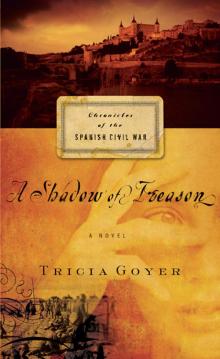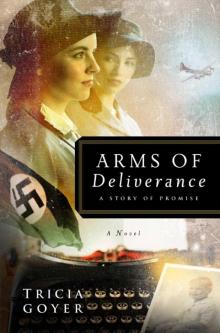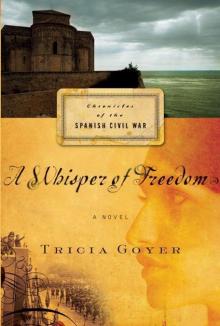- Home
- Tricia N. Goyer
Whisper of Freedom Page 23
Whisper of Freedom Read online
Page 23
The stories continued long into the night, and in the morning they rose and traveled to El Musel. José kept a lookout for Michael, but thankfully there was no sight of him.
"José," Ramona whispered as they approached the docks. "Are you sure we shouldn't try to go too?"
"This is my country. I cannot abandon her… I will fight for her honor until no hope remains." José squeezed Ramona's hand tighter. "But if you would like—"
"No. I'm staying with you."
José nodded, then led the horses onto the large fishing boat. He wondered, too, if it would be the last time he'd see the beautiful creatures.
Calisto's white and gray tail swung lightly as he boarded. Erro followed, as did the four mares.
After obtaining paper and a pen from the captain, José hastily jotted down a note, and then handed it to Petra for safekeeping.
Señor Adolfo, These three souls have served you well. They have worked to rescue what belongs to you. Any harm caused to your family rests on my shoulders alone. Care for them as I would. Gratefully yours, José
Though tears filled his eyes at their departure, a joy filled José knowing he had succeeded. The horses would be safe. He had protected them. And he'd now sent them to their proper owner. Though Michael had failed him, José had no reason to distrust Adolfo. Michael's uncle had always been a fair man. A good man.
When they were boarded and secure, José and Ramona exited, and then they stood on the dock and waved good-bye.
Walt had paid José generously for his work watching Michael, and he'd always felt like too much of a traitor to spend it. Until now. The money would be used well, paying for their passage to France. He let out a soft breath knowing those most precious to him—those he'd protected—would be safe.
* * *
Petra curled herself as close to Juan as possible. Others pressed around her. Those with faces she could not see in the darkness of the hold. It felt strange being huddled so close to strangers. Every once in a while she'd feel breath on her heek or the brush of a hand or foot as the person next to her adjusted himself. She could tell that the person was young. His breathing had a different tone to it than the nasally sound of Juan's breathing. He also had a smell about him like pine and soil. She wondered if she did too. She considered asking—speaking into the darkness, but knew she wasn't allowed. There was always the chance that passengers above would hear them. There was always the chance of passengers who would point them out to save themselves. She shuddered at the thought of the Nationalist boats that patrolled these waters, and she hoped that they would be some of the lucky ones to slip through.
As much as she could, Petra slept. It helped the time go faster. Then, when she awoke, she listened closely to make sure she could hear the breathing of the old men. Tomorrow she would be in France. And a few days later in Paris. She had first traveled from Guernica to Bilbao in search of Edelberto . . . and before the week was out she would see him. Her stomach trembled at the thought of it.
Ritter considered his new assignment—to ferry a war-weary Junkers Ju.52/3, with its cargo, to Granada the following day at dawn. These trimotor transports usually had a two-pilot crew to manage the complex fuel transfers and monitor the propeller rpm of the three 750 horsepower, nine-cylinder BMW radial engines.
Still, Ritter wondered if it were better that he went alone. It played into his plan nicely. The only trouble he had was the last time he'd seen Monica. She exited Göring’s office the same time he entered. Monica hadn't said a word. Instead, she avoided looking at him and veered off the path to walk around him.
But even more than her silence was the look in her eyes. It was as if she was bidding him a silent good-bye with her gaze.
Ritter knew something was wrong, so he decided to carefully check the Junkers before the morning flight.
When "lights out" finally darkened the airfield, Ritter—armed with a flashlight—started his preflight with the propeller on the front of the fuselage. He worked his way around the entire aircraft, checking each nut, bolt, clevis, and control cable.
He walked out onto the wing and checked the complex flaps and the ailerons to make sure no worn parts existed that could fail at the wrong time. The big, all-metal transport appeared to be well used but airworthy. Still, the feeling that something was wrong would not leave him.
Glancing around, he found a heavy-duty broom leaning against a hangar wall and swept the oil-spotted ground all around the aircraft to cover his tracks. Once finished, he hurried to the barracks where he'd stay the night. Then he tried his best to get some sleep before the flight.
The watch commander woke him an hour before dawn. Ritter showered, ate a quick breakfast, and headed out to his aircraft. He walked the perimeter, and something looked different. The broom marks appeared to be going in the opposite direction of those Ritter made last night. Or perhaps it was just his imagination.
In the cockpit, the crew chief ran up the engines. Behind him, the fuel truck pulled away. It was time to go. Göring had one plan, but Ritter had another.
He pushed his worried thoughts from his mind. Nothing is wrong. I'm just mistaken about the strokes of the broom, he assured himself, knowing he had time to recheck the aircraft while taxiing to the takeoff position.
As the aircraft taxied, he repeatedly moved all the controls from stop to stop, looked out the window, and checked for oil or gas pouring over the wing. Nothing. He applied the brakes. They worked fine. He slammed the rudder from left to right. The huge vertical surface followed every move of the control cables.
Just before he taxied into the takeoff position, he ran up each engine, checked the dual ignition for drop off, and found that all six magnetos were working within limits. He cycled the three props; all responded perfectly from maximum fine pitch to full pitch. Ritter knew that dozens of eyes—of the other pilots, those in the tower, and the ground crew—were watching him, and the precautions he had taken were all normal for any pilot to perform before takeoff. He scanned the office, almost expecting to see Monica there, but there was no sight of her. He blew out a low breath and told himself just as an adulterer often accused his spouse of cheating, so a thief and deceiver worried about being deceived.
Out of habit, Ritter rotated the plane 360 degrees, checking for other aircraft in the pattern before takeoff. The lightening skies were clear of approaching aircraft. It was time to go.
Ritter advanced the three throttles slowly, allowing the big radials to respond without loading up. The low-wing trimotor started on its takeoff roll. It sounded more like a moving sheet-metal barn full of running tractors than a modern warbird. He kept the plane headed straight with application of rudder input and a slight tap on the brakes.
As the plane gained speed, Ritter moved the control wheel forward a bit to get the tail off the ground for less drag and better visibility. The plane was easier to hold straight now due to the added air flowing over the rudder. With one eye on the airspeed indicator in kilometers per hour, and the other on his takeoff path, he waited until the airspeed needle bounced on 125 kph—the magic number for a lightly loaded takeoff. The rumbling noise stopped, and soon the only distraction was the shaking of the airplane as the unbalanced wheels started to vibrate.
A tap on the brakes, on top of the rudder pedals, stopped the wheel shake immediately. The big old tin bird was in the air and climbing out just the way her designers had planned.
Ritter scanned the engine instruments, his tense body looking for any movement through the air that didn't seem normal. Nothing appeared wrong. As if welcoming him to the sky, the sun's rays crept over the mountains, indicating clear blue skies for his trip to Granada.
All was well.
Chapter Thirty-One
Thirty minutes after takeoff, the Junkers reached its cruising altitude for the remainder of the short flight. Ritter trimmed the plane for level flight by reducing the manifold pressure of each engine and applying more pitch to the propellers for a faster cruise under lowered rpms. He l
eaned the mixture on each engine, checking the fuel flowmeters, looking for reduced flow without reduced rpms.
After setting the elevator, aileron, and rudder trim for level flight, Ritter settled back into the pilot's seat, opened his thermos of coffee, and prepared for a boring flight.
He'd just crossed over into Spain when a rattling noise woke him from his daydream. There it was again. He grabbed the control wheel and rotated it. A loud snapping noise caused fear to pound in his heart, and the control wheel went limp in his hand. Someone had cut the cables to elevator and ailerons—they'd most likely seared them enough to allow for takeoff before they failed.
He immediately thought of Monica. Had she told Göring of his knowledge of the satchel's contents? If so, why? She was the one who had urged him to look.
Or perhaps Göring still didn't know. It had never made sense why the American had pushed herself into Göring’s inner circle. Perhaps she was using Göring as well.
She had got the information she needed . . . and to her Ritter was just extra baggage.
Does she think she can get rid of me this easily?
Ritter knew the rules of flight—fly high enough to pick out a good landing area if necessary, know where you are at all times, and know his airplane and how to cope with in-flight problems. Loosing the elevator and ailerons was a rather high-priority problem, but nothing he couldn't handle.
He tightened the straps on his seat chute, checked all the buckles and straps, and made sure the rip-cord handle would release from its pocket.
The plane had been trimmed for level flight before the emergency. He had plenty of altitude, and if the plane continued on for just a few more minutes he would be out of the mountains and over the Spanish fields of grain, which would certainly be a better landing strip than rocks, hills, and the huge trees he was leaving behind.
As the Junker lumbered away from the hills, Ritter knew his first priority was to make a thirty- to forty-degree course correction to starboard, thus avoiding the rising hills in his current direction. The fields of golden grain were just a bit off his current path.
Good old Junta Ju had engines on both wings and one in the nose, making the turn possible—even with the damage. This type of plane climbed and descended not by the elevator, but by engine power or lack of engine power. It was possible to get Junta Ju back on the ground in one piece in a rather hard, but survivable, landing.
About five miles in the distance, right off the nose, he spotted a wide farm road intersecting two wheat fields. The road was about five to seven meters wide.
Ritter prepared the plane for an attitude landing—nose high—controlled with the right amount of flap, engine power, and trim settings of the elevator. With gentle nudging of the two wing-mounted engine throttles, he lined up the plane with the road. He slowly reduced the power of the main fuselage engine and started rolling in an elevator-up trim.
Mother Nature was on Ritter's side for once, supplying a steady ten-knot wind right onto the nose, thus slowing the landing speed by ten knots. Ritter scanned the area again, hoping the farmer owning the field had slept in this morning. The last thing he wanted was to tangle with a huge wheat reaper being towed down the road by a team of oxen. Even Junta Ju was no match for a multiton oxen team.
Ritter prepared for the final approach. He held the big plane just above the road and slowly reduced the power. The plane settled and bounced once. With no elevator to hold the nose up, it bounced again and settled into a jittery roll down the dirt farm road.
Ritter kept the plane on the road by using his still-working rudder and brake controls. A minute later, the Junker came to a halt, right on the road. The road was slightly uphill. Just on the other side of the road was a wide, dry creek filled with rocks that Ritter had seen as he was setting up the approach.
Only when Ritter had landed, and his stomach had settled, did he consider what to do next. It took less then thirty seconds for him to decide the plan of action.
If she wants me dead, let her think she has won.
He threw his traveling bag with clean uniforms and other necessities out the window. He made sure the address Göring had first given him was in his pocket. If word got back that he was dead, then Göring—or Monica—would never expect Ritter to arrive, which Ritter was glad about. Now he answered only to himself.
He left his parachute on the seat and opened the pilot's exit door. He then reached over, pushed all three throttles to the wall, and dove out the open door. Juanta Ju came to life, climbing the mild hill faster and faster. When it reached the top of the hill, the plane had nearly reached flying speed. With full throttle and full-up elevator trim, it staggered into the air as the hill fell away from beneath it.
Ritter knew it was going to be a very short last flight, but the more horrific the crash, the longer the investigators would take to realize she was a ghost ship bound for no place, with no one on board except the devil. If they even investigated. With all that happened in Spain, he questioned if they even would.
The plane gained fifty meters when one of the wings started to dip. With no pilot aboard to correct it, the bank became almost vertical. As if doing a dying dance, the plane pivoted and then plummeted nose first into the rocky creek bed. It hit with an agonizing death yell, and then the almost-full fuel tanks of high-octane aviation fuel blew, causing an explosion and fireball that rose into the sky like a beacon. Those in the Spanish countryside would assume another enemy plane had been shot down.
Ritter bent down, threw open his bag, removed his uniform, and changed into civilian clothes. He'd survived on the ground in Spain before—he’d do it again.
Ritter was dead. Ritter was alive. It was time to bail out of his life in the Luftwaffe and head for more friendly skies. But first, he had to find a way to beg, borrow, or steal a lot of money to start his new life.
He tossed his bag over his shoulder, stuck a sweet wheat straw in his mouth, and headed south.
Even though the ground was hard, and a rock or stick poked at her side through the blanket, Ramona relished being in her husband's arms. José's arm was under her, and she snuggled with her cheek to his chest. She could tell by his breathing that he was still awake. Could tell by the softness of his breaths that he, too, lay there thinking.
"Are you worried about them? Wondering if they'll make it all the way?"
"Sí," José whispered. "And what kind of reception they'll receive in Paris. Adolfo abandoned the horses and their caregivers. How will he feel to have them show up on his doorstep?"
"Not to mention the girl."
"Petra, yes." José hesitated as he said the name.
"So . . . how did she come to be with you?"
"She arrived on the front steps looking for Edelberto. She had met him in Madrid two years before. She survived the bombing in Guernica. All her family was lost. After that she didn't have anywhere to go."
"She wasn't from Guernica. I've lived there my whole life and worked in every school and hospital. I never saw her. In fact, I don't think she was a poor girl, as she tried to make us believe."
"I know. If she knew Edelberto, it makes sense she wouldn't be."
"Perhaps her parents were Fascists."
"Perhaps. Or maybe some of the wealthy from farther south. Many were rounded up and killed."
"She lied to you."
"She was lost and scared," José shot back.
"You cared for her greatly." Ramona bit her lip, surprising herself. She thought she was over that—thought she'd dealt with it. Obviously not.
"I loved her like a sister, or a daughter."
"Nothing more?"
"I have to admit. There was a special feeling there. She followed without question. She looked up to me. She trusted me."
Ramona felt the pain in her chest. The younger woman had behaved more like a wife than she had. Why had she been so foolish? Ramona felt tears coming to her eyes, and her throat constricted.
"Ramona?"
"Mmm-hm." She dared not
speak for fear a sob would escape with her words.
"It is you, only you, I wish to hold in my arms. Tonight. Tomorrow. Forever."
She nodded her head, but still the accusations would not leave her mind. Why didn't you believe him? Trust him? You better than anyone should know his heart.
"Darling. The time we were apart was hard on me. But everything turned out. God worked it for our good." José's breathing slowed, and she knew he was drifting toward sleep.
A peace settled over her.
"There is a reason we are still here," José mumbled. "I trust if we are meant to leave, we will. Until then, there is a war to fight."
She sighed. "I'm not very good at fighting."
"No, but you are good at mending. And that's what they will need." José's voice grew softer as sleep threatened to overtake him.
Ramona didn't ask who "they" were. She knew many in Spain needed her help. Yet even if she had the knowledge, what good would she be with no facilities or supplies?
"Lord, I commit myself and my husband into Your hands," she whispered as she drifted off. "May we be used as vessels . . . of Your peace. To bring hope to the hopeless and healing for the injured."
Chapter Thirty-Two
Sophie yawned. The long days and sleepless nights were catching up with her. She'd made many friends, if that's what one would call them, who were more than interested in her art. When the men and women took their daily siesta, she found it was the perfect time to wander through the castle "reclaiming" maps and bits of information for the cause.
Since she was American, no one wondered why she didn't rest. And as an artist, no one thought it peculiar to find her in remote rooms, copying the mosaics or reliefs onto her canvas.
Then, during the nights, she moved through tunnels to the place she met with the guerilla fighters. Tomas had shown her the path, and she'd become an expert at knowing which turns to take. She traveled alone, with a single candle as her light.

 Shadow of Treason
Shadow of Treason Arms of Deliverance
Arms of Deliverance Whisper of Freedom
Whisper of Freedom Dawn of a Thousand Nights
Dawn of a Thousand Nights Valley of Betrayal
Valley of Betrayal